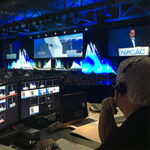Liz King, founder and owner of Liz King Events in New York City, knows a thing or two about keeping people engaged. At TechsyTalk Live, an annual event-technology conference that King hosts in Manhattan, she scheduled Trevor Lynn, chief marketing officer at Social Tables, to speak in the final slot — which happened to be after 4 p.m. on a recent sunny Friday afternoon.
Lynn and his presentation — predictions about what changes to expect in the industry over the next 15 years — rose to the occasion, keeping attendees in their seats, scribbling notes and tweeting, until the finish line. You can find Lynn’s entire presentation on Slideshare.
1. Event technology will be free and integrated. Event tech companies tend either to have full-on end-to-end solutions, or to do one thing really, really well, Lynn said. As technology improves, he said, products will integrate. “We’ll start to see free products being able to work with free products, and we’ll be able to put all this together online and create the perfect software for each event.”
2. Events will be personalized to each attendee. “How would you change your event if you could pinpoint every attendee, and just serve them what they were there to see?” Lynn asked participants. Technology like iBeacons are making that a reality by transmitting personalized information to attendees’ smart phones and devices.
3. There will be a subscription model for events. Subscription models are popping up everywhere, from monthly software contracts to fitness-class subscriptions that allow users to go to as many classes as they want anywhere in a city. “From an event organizer’s standpoint, how does that model affect which events you want to host and who you want to target?” Lynn asked. “And what would a subscription of X number of events look like?”
4. Content will be crowdsourced. Attendees already can make speaker suggestions and submit content and topic ideas. Some registration companies currently are set up so that attendees pre-select the talks that they want to go to, and if sessions don’t attract enough attendees, they’re dropped from the agenda. “That’s level one,” Lynn said. “Level two is total audience engagement, with the audience creating the event for us.”
5. Events will be crowdfunded. “Crowdfunding an entire event, that’s the ultimate commitment by an attendee,” Lynn said. “That’s how you can take an attendee from being a passive attendee and make them a true participant. They’re invested in the cause — there’s a lot more word of mouth. You can get a lot of social sharing this way.”
6. Virtual audiences will be a basic component of events. “We have Periscope. We have Meerkat. How does that virtual audience impact events?” he asked. And further, how do events serve a virtual audience? “What about augmented virtual reality — what does that look like?”
7. Live events for revenue. “Millennials are heavily experience-based, they love paying money for concerts and to be out,” Lynn said. Live experiences are revenue generators, and people — including entrepreneur Mark Cuban— are starting to invest in companies that are all about creating immersive experiences. “That sounds a lot like an events company,” Lynn said. “How do we as event planners start to look at that? How do we maybe start creating events that are 100-percent experience-based to accomplish our goals?”
8. Discovery. Most planners and event organizers recognize the struggle to get the attention of potential attendees. Eventually, Lynn predicted, technology companies are going to focus on helping people discover events. “Just the way Google solved finding information on the Internet, somebody will solve finding events online.”
9. Events will get better at data. “There’s a massive amount of data around events, and we don’t really understand it yet, because there’s just so much,” Lynn said. “You have social signals. You have online signals. You have information that you can infer from activities. You start looking at check-ins that happen during events. Where are your attendees going? What are they saying?” Given all those data points, how can you take that information and make connections so you can improve your event?
10. The number of event planners will continue to rise. The U.S. Department of Labor estimates that there will be a 30-percent increase in event planning between now and 2020. “A 30-percent increase is 30,000 people,” Lynn said. “That’s pretty big. We have all sorts of weird things happening, right? We have technology that’s now automating some of the administrative work, but we have a lot more events being planned and now we have a lot more people coming into the ecosystem planning these events.”
11. Event logistics will be automated. “As you’re looking at your own company, maybe instead of, Hey, I can use this software to automate someone out of a job,” Lynn said, “what if we look it as, I’m going to use this software to automate what they do now and that’s going to elevate and let two more people come on board because I’m so efficient?” Look at automation as a way to grow.
12. Event planners will be more strategic. “At the end of the day, all of this just comes down to [meeting professionals] being able to do what they’re really great at — which is creating amazing experiences,” Lynn said. The future will hold fewer logistics and last-minute phone calls, less checking people at the door and making sure they’re there, less helping people load stuff in the back door. There will “be a lot more about how can I think about the attendee, how can I create the ideal attendee experience,” Lynn said, “because I don’t have to worry about paperwork.”



